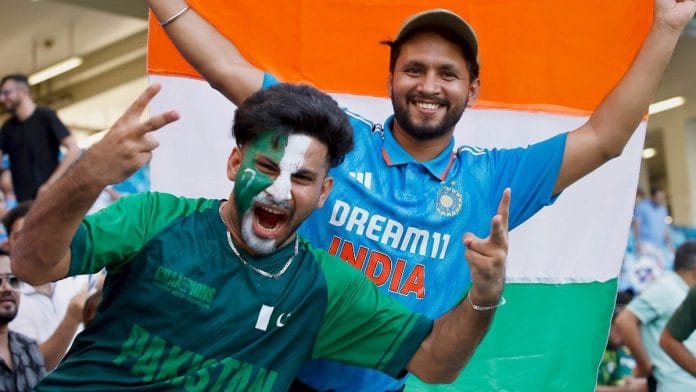India has beaten Pakistan in their Asia Cup opener, with yet another clash now due in the Super Four, but it is high time to go back to the drawing board of national security, counter-terrorism measures, and warnings that terror and talks cannot go together.
After the Pahalgam terror attack, Pakistan Prime Minister Shehbaz Sharif’s offer for talks on Kashmir, counter-terrorism, and trade with India was categorically rejected by New Delhi. The spokesperson of the Ministry of External Affairs (MEA) stated in unusually strong words, very rare for a seasoned diplomat, that any engagement with Pakistan has to be bilateral, terrorism and talks cannot go together, and all the terrorists listed by India must be handed over by Pakistan for prosecution. The MEA even went to the extent of demanding that Pakistan vacate territory in Pakistan-occupied Kashmir (PoK) if it wanted any talks on J&K.
Soon after the heinous Pahalgam terror attack, India took the punitive step of keeping the six-decade-old Indus Water Treaty (IWT) in abeyance, much to the fury of Pakistan and its friends. But New Delhi couldn’t care any less. A day after the attack, India announced that it would keep the IWT in abeyance “until Pakistan credibly and irrevocably abjures its support for cross-border terrorism”.
Subsequently, Operation Sindoor was a decisive attack on Pakistan’s terror mechanism. On every forum, Indian spokespersons, along with teams of members of Parliament who went to several countries on outreach missions, rose above party affiliations and stood strongly with each punitive decision of the government against Pakistan. It appeared to be a fight to the finish, with no thaw in relations anywhere in sight.
Then came the Asia Cup cricket tournament.
Also Read: Playing Asia Cup with Pakistan was the worst decision India could have taken
Questions the Indian govt must field
Have the totally avoidable overs in the Asia Cup sent mixed signals and diluted our unwavering resolve to fight terrorism sponsored from Pakistan’s soil? The government needs to explain the reasons for this sudden ‘olive branch’ while Islamabad continues to dare India to take punitive action and play the victim card. At the global level, Pakistan’s friends will probably continue to support its shenanigans against India.
The government should also clarify certain queries that are circulating on social media. If true, reports suggest that the decision to play cricket with Pakistan has earned the Pakistan Cricket Board (PCB) nearly 1.1 billion Pakistani rupees (about Rs 34 crore in INR) from the Asian Cricket Council (ACC) for the 2025-26 financial year. If it has really earned this amount, is it likely to remain with the PCB, or will a substantial share go to the government?
Meanwhile, there were tensions on the field. Enraged at the “no-handshake snub” by the winning Indian team, former Pakistan cricketer Shahid Afridi waded into a political minefield by accusing the Narendra Modi government of “playing the Hindu-Muslim card” and, additionally, showered praise on Congress leader Rahul Gandhi.
“I have been saying repeatedly that this government plays the religion card, plays the Muslim-Hindu card to come to power. This is a very nasty mindset,” Afridi reportedly said on a Pakistani news channel.
Afridi can be dismissed as a habitual India-baiter, but has any government agency, the Army, political party, or civil society leader condemned him and his ilk? What did India achieve by playing cricket with Pakistan and defreezing relations without any tangible outcome on its stand that terror and trade, talks, water, and diplomacy cannot go together?
Also Read: Indian cricket team and its half-hearted performative patriotism
Let’s not dilute our own message
The recent Shanghai Cooperation Organisation (SCO) meeting held in Tianjin, China, witnessed the successful isolation of Pakistan in yet another international forum. It went to the extent of passing a resolution condemning the Pahalgam terror attack, albeit without mentioning Pakistan.
After this isolation, playing cricket with Pakistan could be seen as giving up the diplomatic leverage that New Delhi had gained in the SCO and other international forums. The larger question is: will the world take us seriously anymore?
Will the government pull up the BCCI for playing cricket with Pakistan in total violation of the diplomatic and strategic embargo on such sporting, trade, and cultural events? The BCCI is not unapproachable, nor is its command structure unknown or beyond the control of the government. And now, after cricket, will the government lower the restrictions on trade that were imposed post the Pahalgam attack? The Directorate General of Foreign Trade (DGFT) notified on 2 May 2025 a ban on the direct or indirect import of all goods from Pakistan with immediate effect in the interest of national security and public policy.
While India’s imports from Pakistan were a mere US$ 0.42 million in April-January 2024-25, exports were reported at US$ 447.65 million. If playing cricket was acceptable on the argument that it improves “people-to-people relations,” then why not improve business-to-business relations as well by removing trade restrictions?
Nothing can be more sacrosanct than national honour, the sacrifice of civilians and the defence forces, and above all national pride and self-respect. Not diplomatic relations, trade, water, talks, sports, or any type of engagement with Pakistan — until that country eschews terrorism and starts behaving.
Seshadri Chari is the former editor of ‘Organiser’. He tweets @seshadrichari. Views are personal.
(Edited by Asavari Singh)






